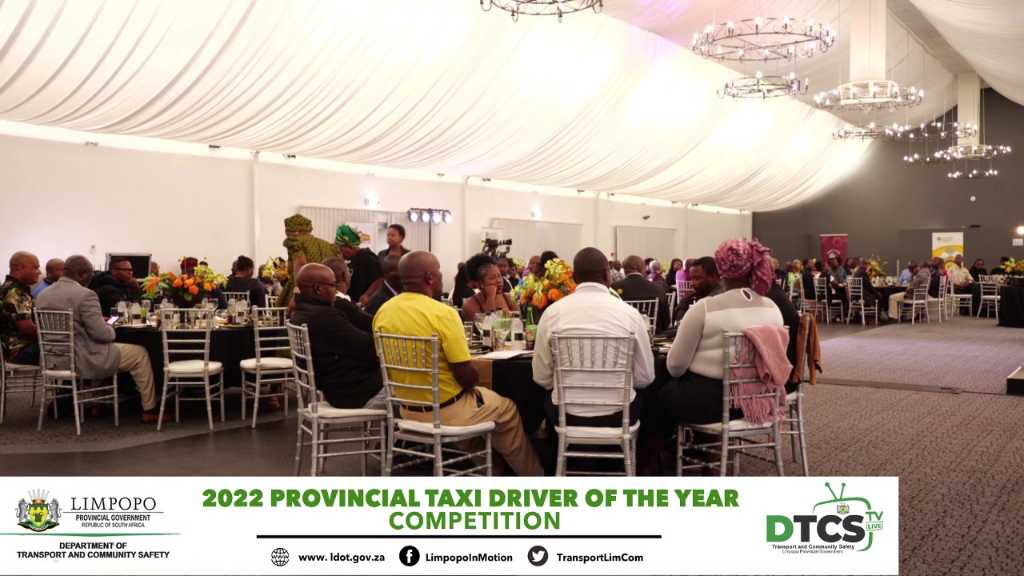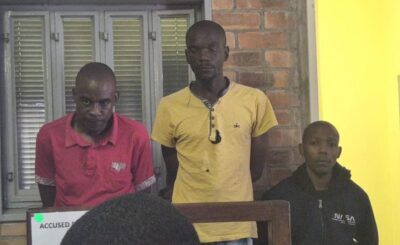Tonight we are celebrating the great men and women, within the
public transport industry, whose work is deemed as menial, but is
making a significant impact to the growth of our economy.
It will be remembered that I joined this department in the middle of
the October Transport Month, when a lot of activities were happening
as part of celebrating the important role transport plays in our social
and economic lives.
Sadly, I missed out on the build-up activities towards this event, and I
could not officiate in the events that preceded this occasion.
However, I remain grateful to the warm reception that I received from
officials in the department, and most importantly from our ‘brown
and khakhi-clad men and women’, who are leading the charge, as far
as road safety is concerned.
The street carnival that greeted me, as we paraded through the
streets of the City of Polokwane on the occasion of the launch of
October Transport Month, will remain etched in my memory.
While this may sound too insignificant, I believe It is humble events
such as these, which send a strong message to the public that our
department cares about their safety and security, both in their homes
as well as on our roads.
Two days ago, we had the opportunity to bestow honour and
recognition to the families of our departed traffic officers who
perished during the Covid 19 pandemic.
This was an important gesture for the families who needed closure
after losing their loved ones in the line of duty. Their memory should
always be cherished in this department.
Programme Director, we are gathered here tonight to mark the end of
the October Transport month, but to also encourage our most
important stakeholder, the Taxi Industry, that Road Safety is a 365
days programme, that cannot only be confined to a month.
I wish to start off by acknowledging the leadership of SANTACO who
are here today from all levels: national, provincial and regional.
Your presence here is very important to us because you are not just a
stakeholder, but a partner. From the onset of this campaign, you have
always shown a keen interest, and even went further to help us to
secure sponsorships for this occasion – and for this we thank you.
By any standard, the Taxi industry is a very big economic player.
Nationally, we have over 400 000 registered minibus taxis which
transport about 17 million commuters daily. This is over 60% of
commuters.
In Limpopo we are servicing about 127 taxi associations with over
9000 registered members operating over 11 000 taxi vehicles with
operating licenses.
Our vision as government is to build and support a unified public
transport system that is professional, free from violence, safe,
affordable; accessible and reliable at all times.
Beyond this, we also want a public transportation system that also
creates more employment opportunities for our people.
One taxi can generate more than three employment opportunities –
that is before we count the rank employees and the number of
dependents who rely on the income of the owner of the taxi and of
the driver.
As we rise out from the ashes of Covid 19 pandemic, to reclaim our
top spot in the hierarchy of public transportation, we have got to
understand that the world is changing daily, and things cannot always
remain the same.
The historic fact we must confront, is that whilst the Taxi industry is
the heritage of our country, it remains traditionally male dominated,
and this must change.
Standing where I am, I know the taxi industry is not an easy industry
for anyone, more especially for women. But the fact that we have 14
women participants in this competition out of 39 is not a mean feat,
whichever way one wants to look at it.
This shows progress – as this would not have been possible a decade
ago. This slow but firm progress is an indication that the industry is
gradually changing for the better.
I applaud the Associations which have welcomed women into their
leadership structures, and those which continue to do their best to
make the industry friendly to women operators and entrepreneurs.
Women must also get involved in the running of taxi family businesses
and must not only wait to take over when their father’s or husband’s
die – as it may be too late for them to learn the ropes of the trade.
Through education, we all have the responsibility to correct the
negative view in society, that owning taxis or driving taxis is a male
job.
Programme Director, We meet here at this Gala Prize giving ceremony
of the Driver of the Year Competition whose main objective, among
others, is to enhance safety on our roads in line with the National Road
Safety Strategy of reducing road fatalities by 50% in 2030.
The Driver of the Year Competition is also intended to improve
knowledge, skills and attitudes of the professional drivers and
ultimately to improve the standard of vehicle driving.
We are using this competition to build capacity within the sector,
because skills development remains a part of our strategy, to reduce
human error amongst drivers on the road.
We shall know that we are succeeding in getting this message across,
if more and more drivers of mini-bus taxis are seen to be obeying the
rules of the road, by not driving recklessly and not over-speeding
when it’s not even necessary.
Changing driver behaviour is the ultimate aim of our Driver of the Year
Competition.
We are doing this, because we have since realised that a significant
number of fatalities on the road are caused by ‘human behaviour’ or
human error.
What is human error? I know many would argue that human error is
nothing else but lack of skill. This is what we have been trying to
address through theory and track tests, since April 2022, when we
started with this competition in the districts.
Statistically, minibus taxis are not the main contributors to road
fatalities at the moment. When they get involved in accident, many
lives are lost, but we are thankful that this has not been the case in a
long time.
Migrants will soon be commuting back home for the December
holidays, and the risk of accidents will be amplified.
This is where I expect you to make good use of the skills you have
learned, through this competition, so that we can reduce the number
of people dying on our roads unnecessarily.
Beyond the question of human behavior and driver fitness, which we
are trying to address, I implore you to also take good care of your
vehicles to check whether they are roadworthy to carry passengers.
Things like faulty brakes, worn-out tyres which result in trye bursts,
and the general un-roadworthiness of a vehicle, are some of the
obvious risks which cause accidents that kill most people on our roads.
Programme Director, as you will recall, these competitions started at
district levels earlier this year, in April.
It is from the pool of deserving district finalists that we have these top
winners, this evening.
I must extend my deep appreciation to our Road Safety Officers across
the Province, who worked tirelessly to bring this project to fruition.
Your hard work has not gone unnoticed, keep on shining the torch
bright.
My appreciation also goes to the sponsors who generated a spark of
excitement to these awards.
Allow me to thank Halfway Toyota for increasing their sponsorship
from last year’s R 20 000 to R 30 000.
Credit also goes to Diageo, Bolivia Lodge as well as the Coca Cola
Company, for always sticking around with us throughout the years.
Congratulations to all the winners of this year’s Driver of the Year
Competition, from the first prize to the last prize. You have made
yourselves and your families proud.
Take good care of the monies and invest wisely. Gratitude should also
go to the Associations and the owners of taxis, who gave their
operators time and space to participate in this competition.
This is an example of what can be achieved when government and the
private sector work together, to bring about change and development
in the lives of our people.
This occasion belongs to all of you. We are happy for everyone who
won and wish to thank the organizers of this competition for a job well
done.
As we come to the end of October Transport Month, let me call upon
the citizens of this Province to do the right thing each time they travel.
Let us not forget to buckle up; let us not drink and drive; let us not
drive beyond the speed limit; let us take rest when we are fatigued
and most importantly, let us not drive un-roadworthy vehicles






